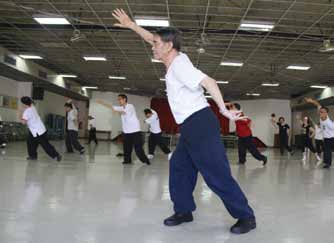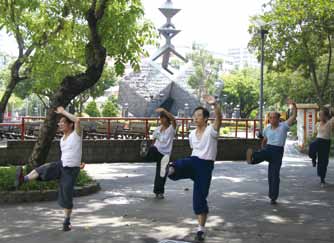Taiji Daoyin Master: Xiong Wei, Rambling Quitely Through the Big Busy City
“Taiji Daoyin and Taiji Quan are not the same,”explains the master calmly and gently.“Quan means‘fist,’reflecting emphasis on the martial arts. Daoyin places weight on breathing exercises and learning to control oneself.”The master is Xiong Wei , creator of the 12 Moves of the Taiji Daoyin system. He was a weak boy, and took up Taiji to strengthen his mind and body. Sixty years on, he exists on the highest plateau of martial arts, and has the air of a wise and learned sage. Xiong Wei has devoted himself to the study of Daoism, incorporating its tenets into Taiji Daoyin, and students from lands near and far, including from Korea and as far away as France and Germany, have come to study under him. He has gone on sojourns to pass on the concepts of Taiji Daoyin to devotees in South Africa, the US, Japan, Singapore, and many other lands, utilizing the dynamic approach of combining demonstration and Chinese poetry in his teachings to unveil the magic and mystery of Taiji, leaving a deep impression with all he encounters. He expounds on the strength of Taiji and the never-ending flow of qi, which permeates all things by quoting a famous line of poetry—“Beyond Suzhou from the Hanshan Temple, the tone of the bell finds my boat at midnight”——qi is just like sound, which permeates all things. In earlier years, Xiong Wei would come to 228 Memorial Peace Park to go through his routines, not far from where the military police stand at attention guarding the adjacent Presidential Office Building , where he worked. He also highly recommends the shaded tranquility of the grounds at the Shilin Official Residence . Now 83, he still loves to throw his simple pack on his back and head out exploring the city's four corners via public transport, moving like the gentle breeze but with steps firm and assured. The Taiji master moves silently through the noisy, bustling metropolis, taking with him and spreading about him the serenity and tranquility of the martial arts world. Xiong Wei 熊衛  In this oasis space, the warm waves of the aftersummer dissipate. The hurried pace of the bustling city outside give way to silent steps. In the square are males and females, from a 10-year-old boy to the silver-haired set. All are intense with concentration, replicating the exact movements of the master before them. From wrists, elbows, and shoulders to waist, knees, and ankles, all points on the body are in synchronized rhythm as a routine of sweeping movements and positions are achieved. The actions are precise but the frame is not taut, and the body is seen as a spheroid, the qi or nature's invisible kinetic energy flowing through smoothly and without obstruction.
In this oasis space, the warm waves of the aftersummer dissipate. The hurried pace of the bustling city outside give way to silent steps. In the square are males and females, from a 10-year-old boy to the silver-haired set. All are intense with concentration, replicating the exact movements of the master before them. From wrists, elbows, and shoulders to waist, knees, and ankles, all points on the body are in synchronized rhythm as a routine of sweeping movements and positions are achieved. The actions are precise but the frame is not taut, and the body is seen as a spheroid, the qi or nature's invisible kinetic energy flowing through smoothly and without obstruction. Placing Taiji Daoyin within the boundaries of the martial arts, Xiong Wei states that“After you draw qi into your body, you use the store of qi energy within, like wave after wave of water. Instead of meeting your enemy head on when he attacks with force, like the sea, you surround and absorb him, layer upon layer, wave upon wave, transforming his strength into yours.”Taiji Daoyin is at one and the same time a display of strength and of subtle beauty; it is little wonder, then, that local performance troupes such as Golden Bough Theatre and U Theatre have asked Xiong Wei to conduct training sessions for their members, teaching them how to keep limbs supple and limber to promote flexibility and rhythm. The special rotation movements of the Taiji Daoyin approach have also been incorporated into Cloud Gate Dance Theatre's celebrated work Moon Water , releasing a flow of beauty and a lyrical, floating visual sensuality that—one might say despite the vigorous flow of qi engendered—takes your breath away.
Placing Taiji Daoyin within the boundaries of the martial arts, Xiong Wei states that“After you draw qi into your body, you use the store of qi energy within, like wave after wave of water. Instead of meeting your enemy head on when he attacks with force, like the sea, you surround and absorb him, layer upon layer, wave upon wave, transforming his strength into yours.”Taiji Daoyin is at one and the same time a display of strength and of subtle beauty; it is little wonder, then, that local performance troupes such as Golden Bough Theatre and U Theatre have asked Xiong Wei to conduct training sessions for their members, teaching them how to keep limbs supple and limber to promote flexibility and rhythm. The special rotation movements of the Taiji Daoyin approach have also been incorporated into Cloud Gate Dance Theatre's celebrated work Moon Water , releasing a flow of beauty and a lyrical, floating visual sensuality that—one might say despite the vigorous flow of qi engendered—takes your breath away.
*Integrating classic writings, invented the 12 Moves system of Taiji Daoyin; has written six books on the practice of it.
*In 2001 he was granted the 9th Chinese Martial Arts Award in the Global Chinese Culture and Arts Awards.

![Taiwan.gov.tw [ open a new window]](/images/egov.png)
